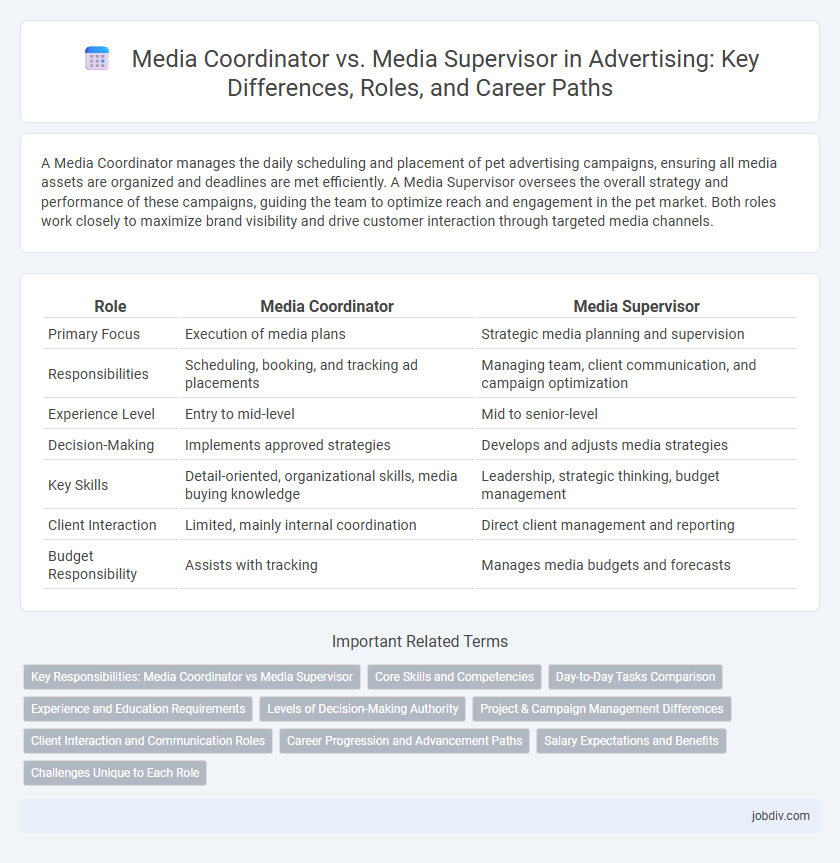A Media Coordinator manages the daily scheduling and placement of pet advertising campaigns, ensuring all media assets are organized and deadlines are met efficiently. A Media Supervisor oversees the overall strategy and performance of these campaigns, guiding the team to optimize reach and engagement in the pet market. Both roles work closely to maximize brand visibility and drive customer interaction through targeted media channels.
Table of Comparison
| Role | Media Coordinator | Media Supervisor |
|---|---|---|
| Primary Focus | Execution of media plans | Strategic media planning and supervision |
| Responsibilities | Scheduling, booking, and tracking ad placements | Managing team, client communication, and campaign optimization |
| Experience Level | Entry to mid-level | Mid to senior-level |
| Decision-Making | Implements approved strategies | Develops and adjusts media strategies |
| Key Skills | Detail-oriented, organizational skills, media buying knowledge | Leadership, strategic thinking, budget management |
| Client Interaction | Limited, mainly internal coordination | Direct client management and reporting |
| Budget Responsibility | Assists with tracking | Manages media budgets and forecasts |
Key Responsibilities: Media Coordinator vs Media Supervisor
Media Coordinators manage campaign logistics, including scheduling, budget tracking, and vendor communication to ensure seamless execution. Media Supervisors oversee strategy development, team leadership, and performance analysis, guiding campaigns to align with client objectives. The Media Supervisor holds higher authority, focusing on optimizing media plans and mentoring coordinators for effective campaign delivery.
Core Skills and Competencies
Media Coordinators excel in organizing and executing media campaigns, demonstrating strong project management, communication, and data analysis skills to support smooth campaign operations. Media Supervisors possess advanced expertise in strategic media planning, team leadership, budget management, and performance evaluation to optimize media impact and drive business results. Both roles require proficiency in media buying platforms, audience targeting, and performance metrics, but Supervisors focus more on high-level decision-making and mentoring coordinators.
Day-to-Day Tasks Comparison
Media Coordinators manage the day-to-day scheduling and booking of advertisements across various platforms, ensuring timely delivery and accurate tracking of campaigns. Media Supervisors oversee the coordination team, strategize media placements, and analyze performance metrics to optimize media spend and campaign effectiveness. Both roles require strong communication skills, but the supervisor role focuses more on high-level planning and team management while coordinators handle detailed operational tasks.
Experience and Education Requirements
Media Coordinators typically require 1-3 years of experience in advertising or media planning, with a bachelor's degree in marketing, communications, or a related field often preferred. Media Supervisors usually need 4-7 years of progressive experience managing media campaigns and teams, along with advanced knowledge of media buying and analytics, complemented by a bachelor's degree or higher in marketing, advertising, or business. The educational background for supervisors is more specialized, frequently including certifications in digital marketing or media strategy, reflecting the increased responsibility in overseeing media operations and optimizing campaign performance.
Levels of Decision-Making Authority
Media Coordinators typically handle tactical execution such as scheduling and campaign tracking, operating under direct supervision with limited decision-making authority. Media Supervisors possess greater strategic influence, managing campaign planning and vendor negotiations while overseeing coordinators and making key media buying decisions. The distinction in decision-making authority reflects a shift from operational tasks to leadership roles that shape overall media strategy and budget allocation.
Project & Campaign Management Differences
Media Coordinators manage the day-to-day logistics of advertising campaigns, ensuring schedules, budgets, and media placements align with the project plan. Media Supervisors oversee multiple campaigns, providing strategic guidance, optimizing media buys, and managing team workflows to achieve broader campaign objectives. Project management at the coordinator level focuses on task execution, while supervisors emphasize cross-campaign coordination and performance analysis.
Client Interaction and Communication Roles
A Media Coordinator handles day-to-day client communication by managing schedules, briefing media teams, and ensuring campaign materials meet client expectations. In contrast, a Media Supervisor takes a more strategic role, leading client meetings to discuss campaign performance, negotiate budgets, and provide media insights that align with business objectives. Effective client interaction for Media Supervisors revolves around building long-term relationships and guiding clients through complex media planning decisions.
Career Progression and Advancement Paths
Media Coordinators typically manage the execution of advertising campaigns and liaise between clients and media vendors, serving as an entry-level role with a focus on operational tasks and data tracking. Media Supervisors advance by taking on strategic planning responsibilities, overseeing teams, and optimizing media budgets to enhance campaign effectiveness, marking a shift toward leadership and decision-making roles. Career progression from Media Coordinator to Media Supervisor involves acquiring skills in analytics, client management, and team coordination, with potential paths leading to Media Manager or Media Director positions within advertising agencies.
Salary Expectations and Benefits
Media Coordinators typically earn between $40,000 and $55,000 annually, focusing on scheduling and executing media plans, while Media Supervisors command higher salaries, ranging from $65,000 to $85,000, due to their strategic oversight and team management responsibilities. Benefits for Media Supervisors often include performance bonuses, health insurance, and professional development opportunities, reflecting their advanced role and increased accountability. Media Coordinators may receive standard benefits such as basic health coverage and paid time off but experience fewer incentives tied to performance metrics.
Challenges Unique to Each Role
Media Coordinators face challenges in managing day-to-day campaign logistics, ensuring timely communication between clients, agencies, and vendors while maintaining accurate media tracking and reporting. Media Supervisors encounter complexities in strategizing media plans, optimizing budget allocation, and leading teams to align campaigns with broader marketing goals amidst rapidly evolving digital platforms. Both roles require adapting to shifting consumer behaviors and integrating advanced analytics to enhance campaign performance and ROI.
Media Coordinator vs Media Supervisor Infographic

 jobdiv.com
jobdiv.com